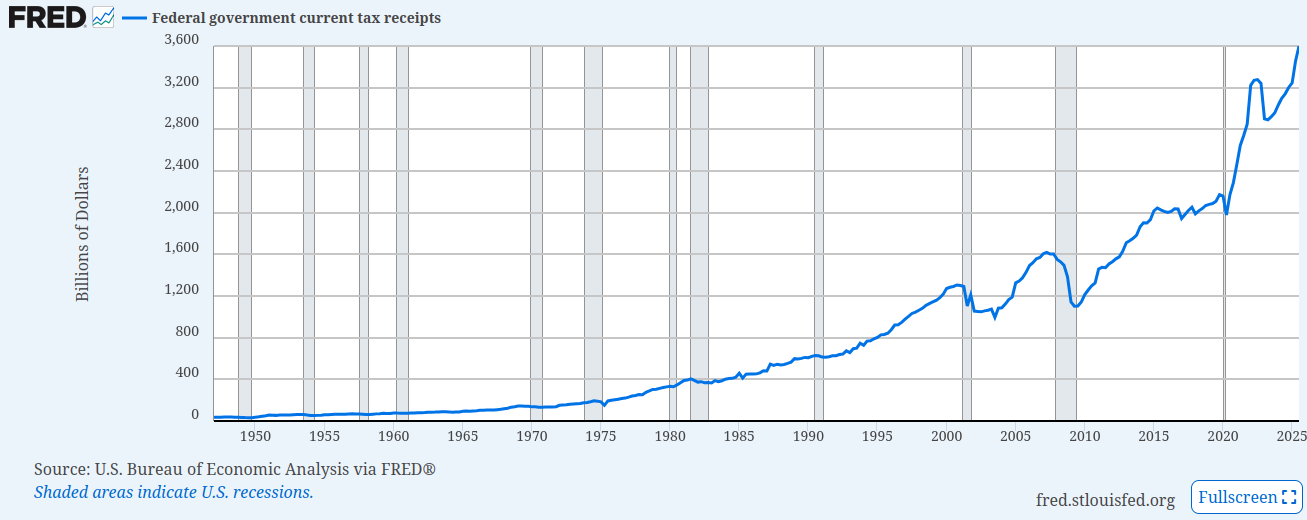As I have said here many times, I have to obey the Lord and at times, as we find so many times on our Bibles, God does not always make 'sense' to our natural minds. This is because he see's things we cannot see and knows things we cannot know. This is one key area where the whole idea of faith comes in. You (and I) just have to trust the Lord, no matter what. I can tell you that it is not easy to do. Ask Job, ask Abraham, ask any true servant of God and they will tell you.
But today, I am going to break with that and share something that everyone in the US should know and understand, but many clearly don't. At least not in a way that makes them want to change anything about it, particularly at the ballot box. FYI, some of this was written back in October of 2025, just as the shutdown started.
I believe that we as a nation have kind of crossed a fiscal red line (point of no return) that few in Washington are articulating to the people. A few in Congress have let the cat out of the bag, but to most folks who surf the net or watch cable news, it's one of those things that goes in one ear and out the other; in between commercial breaks, internet rants or a text message.
I have chosen the title of this piece for a reason. Think of a captain of a ship at sea (back in the days before GPS). He had to have charts in order to get to where he was going if he did not want to be lost at sea. Well, in the economic arena, charts, graphs, as well as balance sheets will often tell a person with alarming accuracy just where they are heading, financially - into a mansion or a homeless shelter. It's all in the charts.
On that note I will pass on a few charts that you all may find of interest. Please note the first three charts are government figures, not cherry-picked ones from any blog or site.
Interest Expense on US Debt
(in billions)

Data Source: Bureau of Economic Analysis via FRED (more here)
Now that you have seen that chart. Take a look at this one, also from the same source, FRED (the Federal Reserve Economic Database).
US Tax Receipts
(in billions)

Data Source: Bureau of Economic Analysis via FRED
The Joint Economic
Committee (US Congress) has
a paper here you may find of interest.
More here
(updated link). Here is a screenshot of part
of what is on that page.

Source (with updated version
at): Joint
Economic
Committee
(US Congress)
My point is this. The time to
talk, debate and otherwise jawbone about the
debt is over. Many Americans today seem to
think the fiscal 'fairy godmother' is going to
come in and save the day. That somehow they
can avoid the pain associated with America's
horrific fiscal overindulgence - decades in
the making. That all of these most expensive
social programs are a 'right' they can demand
or the courts can 'force' the government to
pay. They aren't and this is going to be
driven home to millions one day, sooner or
later; one way or another.
Which brings me to this. Yes, I
do think there may be a little more to the
last and upcoming shutdowns than meets the
eye. What happens when the US cannot find the
money to run their government? Or when
bondholders, the major ones start selling
their US debt? These kinds of things signal
that the US can't get is act together and
makes lenders kind of nervous. I do not
believe that these are the kinds of things
that much of the news media is likely to
explain to its audience with any depth.
These kinds of thing can as
well, be inflationary. Want to know why things
are expensive and getting more so? I will tell
you. Inflation - real inflation, not the PC
number given to us by government. I do not
know about you but my expenses have gone up
way more than 2.8% in 2025. We may not be
hearing the word inflation much. That's
because it looks to me like a new phrase has
been coined for it - an affordability
crisis. Smart investors often tend to
seek shelter if they think economic trouble or
significant inflation is ahead. Have we seen
any major moves in precious metals over the
past few months? I will let you answer that
question.
I do think both sides of the
political aisle may know that it's time to
make changes or those changes if delayed much
longer, could make an end to American life as
we know it.
The following chart is from the
Committee
for a Responsible Federal Budget
(CRFB)

Source: Interest
Costs
Could Explode from High Rates and More
Debt - CRFB
So just using these raw numbers, we see just how much just carrying our current debt load effects what the government has to spend. It eats up a significant amount of total US receipts using these raw numbers. Yes, the situation is more complicated than this, but the simple fact is - carrying this much debt is a major, major burden because each and every year, the US must go out, cap in hand, to borrow yet more money and as you can see above, pay more interest.
I think it is readily apparent that in some form or another, budget cuts are coming. How big and where are the question and while cuts may be spun as a partisan issue, I think the real issue is purely fiscal - see above charts. I think each side knows that borrowing so much more to pay for things is a habit that needs to be broken very, very soon. This and the fact that the GOP is in charge now puts a further impetus to get down to budget basics which are
- if you don't have the money, you can't pay for it
- and if you can't pay for it
- you can't have it.
These are just a few simple budgetary dynamics that as far as I can see, Washington has not operated from.
So are you ready for more inflation? Think your pay raise is going to cover it? Not likely. It can't because a significant raise in wages across the board in reaction to inflation is inflationary; it generally speaking, just adds fuel to the fire. Inflation when it gets bad enough just causes employers to have higher costs which they are loath to pass on to customers. If they can't do that, what do they do next? I'll tell you. They start laying folks off.
How happy are folks now? Can young people buy a house? How about pay rent? What about food prices? What about utilities? Insurance? Are you ready to see things go up some more? That is what inflation will do. And let me tell you something. Inflation tends to hit the working man the hardest.
Now understand this dear readers. I am not saying these things because I see a solution to the problem. I do not. My view is that any effective solution to it is politically impossible.
Neither party is about to cut their own political throat to try and fix it because they will be voted out of office; only to be replaced by politicians who will go back to bankrupting America. My view is that too many Americans will only vote for 'financial fairy-tale' fiscal policies; Santa Claus sitting in the White House, Congress and the Fed Chair, giving presents to all - with a credit card that is just about maxed out.
Why am I harping in inflation? Because this the easiest way out of the situation or rather, delay the worst effects of it. Easy because most folks do not understand inflation - they hear the word but don't really know what it means - other than things cost more.
There are many kinds of inflation but the one that we need to concern ourselves with is the kind that is induced by monetary policy. I mean inflating the money supply (creating more money). Sounds great but it does not work for long.. at all. The only thing that really happens is that the value of the money is worth less; meaning it buys less goods and services. How is that reflected for you and me? Easy. I don't want to confuse anyone but this is how it looks to you and me. Prices go up.
The same amount of goods and services are available, the problem is there is more money chasing them.
Remember the Pandemic? I can remember going into a grocery store after one of those stimulus checks hit and the shelves... many of them were empty. Why? More money was chasing the same amount of goods. This always makes goods more scarce and then drives the price up.
It's one of those issues that is not partisan, but is easy to spin that way with a few talking heads on TV and social media spinning the stupid things both parties have done and will do into something partisan. Are you looking for someone to blame? Well, who put those politicians from both parties up there? Did you vote for them? Is there a mirror handy in your house? Blame? Is it reflected in that mirror you are peering into?
Will the government try and inflate their way out of this? Maybe... probably. I think they will until they get a real solution to the problem.
Our current President has gotten a lot of criticism over his tariffs. Some on the political left just hate him for it. But it has done something that the politicians in DC have not been willing to do to any degree. What is that? Bring a noticeable revenue stream into the government coffers.

Source: Federal Reserve Economic Data Base
Look I am not going to get into partisan politics. I am neither a Democrat or Republican and I will be the first to tell you that I have never been a big fan of Donald Trump. But he has two qualities that I think the country needs right now if it is to get its fiscal act together. He's got guts and he knows how to read, understand and make fiscally sound decisions based upon a balance sheet.
He knows this because he has run businesses all of his life and made a lot of money. You don't do that by being ignorant of economics and finance. He was a business man long before he was a politician.
He has done other things as well that have made improvements to the balance sheet. Sure, they often sound hard, even cold. But economics and money can seem that way... especially to the indolent or envious. Another thing he has done that might bring money in? The Immigration Gold Card program. Can it conceivably favor the rich or skilled over the poor? Yes. Will it bring in more money to the US? Yes.
Let me ask you this? How else is the US going to get its fiscal act together? Another protest? Another Social Media rant against sound fiscal policies? More sob stories and blank checks that are causing the US balance sheet to bleed red? Who else is going to try and fix this? The Bush's, Obama's, Clinton's or Biden's of this world? I hate to break it to my left leaning friends out there, but it's a hard world. If you don't think it is - let the country go bankrupt and you will see just how hard it is.
This is an existential threat to the US economy. Let me rephrase that because 'US economy' sounds so impersonal. So let me put it another way - yours and my prosperity; the very food in our fridge, roof over our heads, light and heat in our homes and gasoline (or electricity) in our rides. Perhaps that will help the reader better understand the stakes.
It's one of those issues that is not partisan. But know this - poverty knows no partisan boundaries. It's just as cold outside in the winter sleeping on the sidewalk to Democrats as it is to Republicans. Old man winter is not a respecter of political parties. He blows his icicle breath in an equal opportunity manner.
In conclusion let me say this. I am not the least bit optimistic things will improve. This President can buy the nation some time, not much but a little. I do not believe that Washington (neither Congress nor the Courts) will not allow a President to fix this. The only thing that will, will be 'Mr. Fiscal Disaster', showing up in the nation, wrecking his havoc and woe, creating pain and suffering from sea to shining sea. Then (and only then) will we get leaders who will be forced to deal in economic realities. The only real cure I see for this present form of fiscal insanity is pain; long and excruciating. I do not relish or wish this cure for anyone.
Congress. What do they need? I think they need a kind of 'Suicide Hotline' up there. That is, an Economic Suicide Hotline that operates 24-7 with extra operators during any budget crunch. The operators can read from their cue cards - Stop injecting the nation with your economic 'fentanyl' (debt), you are perilously close to taking a lethal dose.
For Christians (the few real ones) I can only say this. I will tell you what I do and you decide what is best for you. I do my best to protect myself as much as I can from the dumb things my fellow countrymen do. I do not expect sanity from people whose behavior leaves serious doubt in my mind about theirs (school shootings, setting people on fire, train stabbings, assassination attempts, etc).
Think about that fictional ship I mentioned in an earlier paragraph... heading into one great big iceberg. Everyone is on deck drunk, partying, high and fornicating in the lifeboats. They are completely out of it. Suddenly, commando's break into the bridge and now are holding the captain and the crew hostage. Under no circumstances are they going to let that captain change course. Why not? They work for a salvage company and have a ship a few miles away and plan on taking what's left and all that is on board once she hits the frozen rock. They've got chains and handcuffs prepared for all the passengers who will be most valuable to slavers. They'll fetch a good price.
And the borrower is servant
to the lender.
(Proverbs 22:7 - ASV)
Now let me make this clear - I don't want to say for a second that disaster is right around the corner. I do not believe that it is. The Fed and Treasury have been exceptionally adept at keeping this whole system afloat despite these massive debt loads. No, my point here is a different one. I believe that the situation is getting to the point where it will be more and more difficult to manage. So when you hear talk of losing subsidies for healthcare or making qualifying for food stamps more difficult, think about those charts.
Ask yourself - who is going to pay for it all? Where is the money going to come from? "I don't care', they just have to pay me my...." is not an answer that will keep things afloat. I know of no bank of 'I Don't Care'. They do not, to my knowledge, issue currency and even if they did, when you tried to redeemed it they would probably respond after a cynical chuckle, 'I don't care'.
This whole situation is like some tragic spoof out of a science fiction show, with the captain shouting orders on his spaceship - 'All ahead full Mr. navigator. Course, the Oblivion sector by way of the vortex of indebtedness.
I ask all who serve the Lord to ask God about these things in prayer and to do your best to be different (more godly, righteous; without being holier-than-thou) than the majority of those around you. I do not think God has a high opinion of most modern day Americans; in fact, I know he does not. But he still cares enough to give us all a little more space to make personal changes in our lives. If we make them, God may spare some of us the worst of what looks to me to be a mathematical certainty.
and hideth himself;
But the simple pass on,
and suffer for it.
(Proverbs 22:3 - ASV)